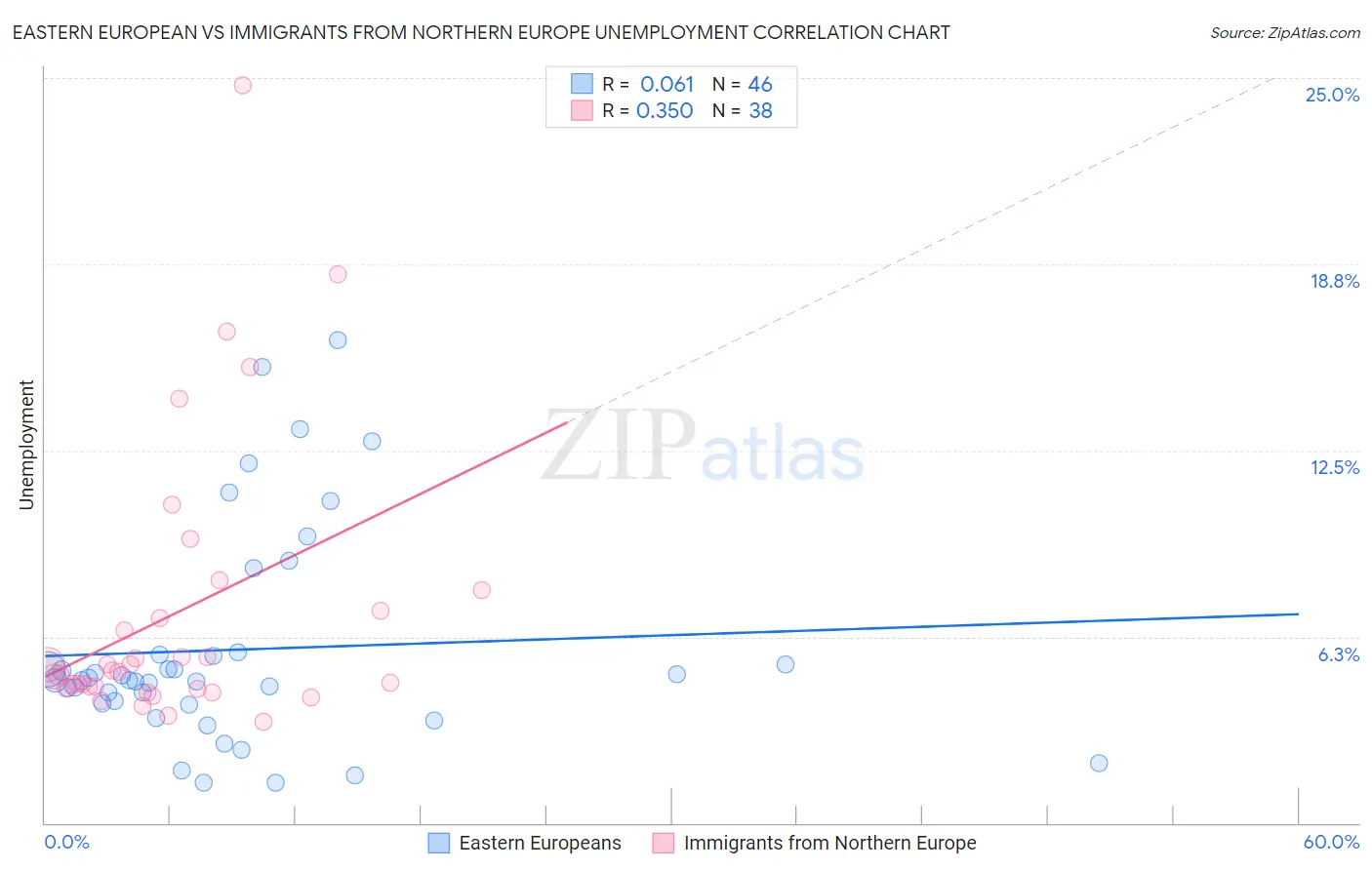Eastern European vs Immigrants from Northern Europe Unemployment
COMPARE
Eastern European
Immigrants from Northern Europe
Unemployment
Unemployment Comparison
Eastern Europeans
Immigrants from Northern Europe
4.9%
UNEMPLOYMENT
99.2/ 100
METRIC RATING
54th/ 347
METRIC RANK
4.9%
UNEMPLOYMENT
98.2/ 100
METRIC RATING
74th/ 347
METRIC RANK
Eastern European vs Immigrants from Northern Europe Unemployment Correlation Chart
The statistical analysis conducted on geographies consisting of 460,325,858 people shows a slight positive correlation between the proportion of Eastern Europeans and unemployment in the United States with a correlation coefficient (R) of 0.061 and weighted average of 4.9%. Similarly, the statistical analysis conducted on geographies consisting of 476,230,323 people shows a mild positive correlation between the proportion of Immigrants from Northern Europe and unemployment in the United States with a correlation coefficient (R) of 0.350 and weighted average of 4.9%, a difference of 1.4%.

Unemployment Correlation Summary
| Measurement | Eastern European | Immigrants from Northern Europe |
| Minimum | 1.4% | 3.4% |
| Maximum | 16.2% | 24.8% |
| Range | 14.8% | 21.4% |
| Mean | 5.8% | 7.0% |
| Median | 4.8% | 5.1% |
| Interquartile 25% (IQ1) | 4.0% | 4.5% |
| Interquartile 75% (IQ3) | 5.6% | 7.1% |
| Interquartile Range (IQR) | 1.6% | 2.6% |
| Standard Deviation (Sample) | 3.6% | 4.7% |
| Standard Deviation (Population) | 3.6% | 4.7% |
Demographics Similar to Eastern Europeans and Immigrants from Northern Europe by Unemployment
In terms of unemployment, the demographic groups most similar to Eastern Europeans are Australian (4.9%, a difference of 0.030%), Celtic (4.9%, a difference of 0.19%), Immigrants from Singapore (4.9%, a difference of 0.26%), Greek (4.9%, a difference of 0.36%), and Bhutanese (4.9%, a difference of 0.39%). Similarly, the demographic groups most similar to Immigrants from Northern Europe are Paraguayan (4.9%, a difference of 0.090%), Burmese (4.9%, a difference of 0.14%), Immigrants from Japan (4.9%, a difference of 0.16%), Serbian (4.9%, a difference of 0.21%), and Immigrants from North America (4.9%, a difference of 0.37%).
| Demographics | Rating | Rank | Unemployment |
| Eastern Europeans | 99.2 /100 | #54 | Exceptional 4.9% |
| Australians | 99.2 /100 | #55 | Exceptional 4.9% |
| Celtics | 99.1 /100 | #56 | Exceptional 4.9% |
| Immigrants | Singapore | 99.1 /100 | #57 | Exceptional 4.9% |
| Greeks | 99.0 /100 | #58 | Exceptional 4.9% |
| Bhutanese | 99.0 /100 | #59 | Exceptional 4.9% |
| Immigrants | Netherlands | 99.0 /100 | #60 | Exceptional 4.9% |
| Cambodians | 99.0 /100 | #61 | Exceptional 4.9% |
| Icelanders | 98.9 /100 | #62 | Exceptional 4.9% |
| Immigrants | Bulgaria | 98.9 /100 | #63 | Exceptional 4.9% |
| Italians | 98.9 /100 | #64 | Exceptional 4.9% |
| Immigrants | Canada | 98.8 /100 | #65 | Exceptional 4.9% |
| Slovaks | 98.7 /100 | #66 | Exceptional 4.9% |
| New Zealanders | 98.6 /100 | #67 | Exceptional 4.9% |
| Slavs | 98.6 /100 | #68 | Exceptional 4.9% |
| Immigrants | North America | 98.5 /100 | #69 | Exceptional 4.9% |
| Serbians | 98.4 /100 | #70 | Exceptional 4.9% |
| Immigrants | Japan | 98.3 /100 | #71 | Exceptional 4.9% |
| Burmese | 98.3 /100 | #72 | Exceptional 4.9% |
| Paraguayans | 98.3 /100 | #73 | Exceptional 4.9% |
| Immigrants | Northern Europe | 98.2 /100 | #74 | Exceptional 4.9% |